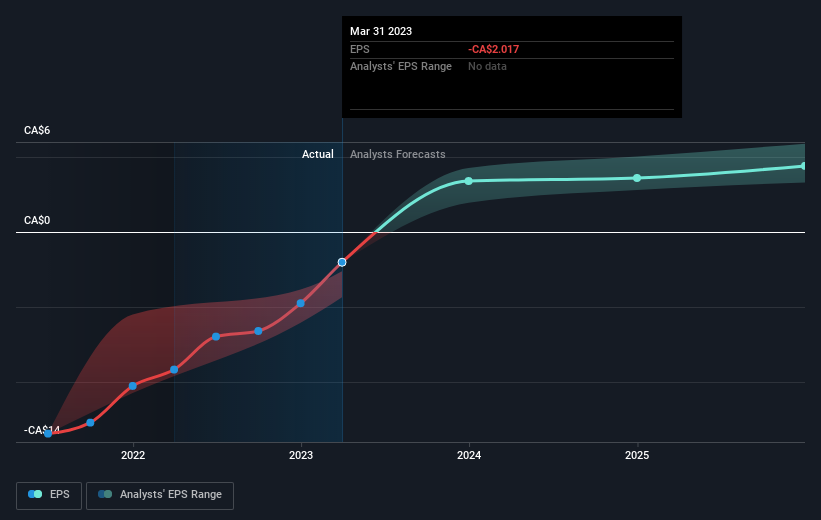We Might See A Profit From Air Canada (TSE:AC) Soon
Air Canada (TSE:AC) is possibly approaching a major achievement in its business, so we would like to shine some light on the company. Air Canada provides domestic, U.S. transborder, and international airline services. The CA$7.9b market-cap company’s loss lessened since it announced a CA$1.7b loss in the full financial year, compared to the latest trailing-twelve-month loss of CA$722m, as it approaches breakeven. Many investors are wondering about the rate at which Air Canada will turn a profit, with the big question being “when will the company breakeven?” We've put together a brief outline of industry analyst expectations for the company, its year of breakeven and its implied growth rate.
View our latest analysis for Air Canada
Consensus from 13 of the Canadian Airlines analysts is that Air Canada is on the verge of breakeven. They anticipate the company to incur a final loss in 2022, before generating positive profits of CA$1.2b in 2023. Therefore, the company is expected to breakeven roughly 12 months from now or less. How fast will the company have to grow to reach the consensus forecasts that anticipate breakeven by 2023? Working backwards from analyst estimates, it turns out that they expect the company to grow 44% year-on-year, on average, which is extremely buoyant. Should the business grow at a slower rate, it will become profitable at a later date than expected.
Underlying developments driving Air Canada's growth isn’t the focus of this broad overview, but, take into account that typically a high forecast growth rate is not unusual for a company that is currently undergoing an investment period.
One thing we would like to bring into light with Air Canada is it currently has negative equity on its balance sheet. This can sometimes arise from accounting methods used to deal with accumulated losses from prior years, which are viewed as liabilities carried forward until it cancels out in the future. These losses tend to occur only on paper, however, in other cases it can be forewarning.
Next Steps:
There are key fundamentals of Air Canada which are not covered in this article, but we must stress again that this is merely a basic overview. For a more comprehensive look at Air Canada, take a look at Air Canada's company page on Simply Wall St. We've also compiled a list of important factors you should further examine:
Valuation: What is Air Canada worth today? Has the future growth potential already been factored into the price? The intrinsic value infographic in our free research report helps visualize whether Air Canada is currently mispriced by the market.
Management Team: An experienced management team on the helm increases our confidence in the business – take a look at who sits on Air Canada’s board and the CEO’s background.
Other High-Performing Stocks: Are there other stocks that provide better prospects with proven track records? Explore our free list of these great stocks here.
Have feedback on this article? Concerned about the content? Get in touch with us directly. Alternatively, email editorial-team (at) simplywallst.com.
This article by Simply Wall St is general in nature. We provide commentary based on historical data and analyst forecasts only using an unbiased methodology and our articles are not intended to be financial advice. It does not constitute a recommendation to buy or sell any stock, and does not take account of your objectives, or your financial situation. We aim to bring you long-term focused analysis driven by fundamental data. Note that our analysis may not factor in the latest price-sensitive company announcements or qualitative material. Simply Wall St has no position in any stocks mentioned.
Join A Paid User Research Session
You’ll receive a US$30 Amazon Gift card for 1 hour of your time while helping us build better investing tools for the individual investors like yourself. Sign up here

